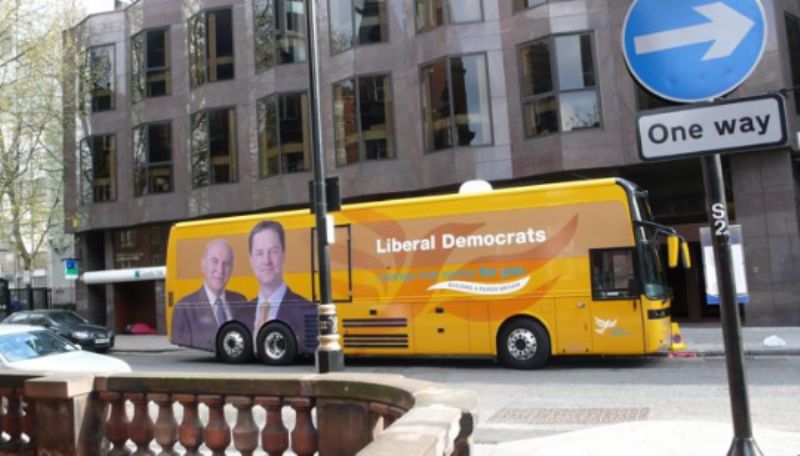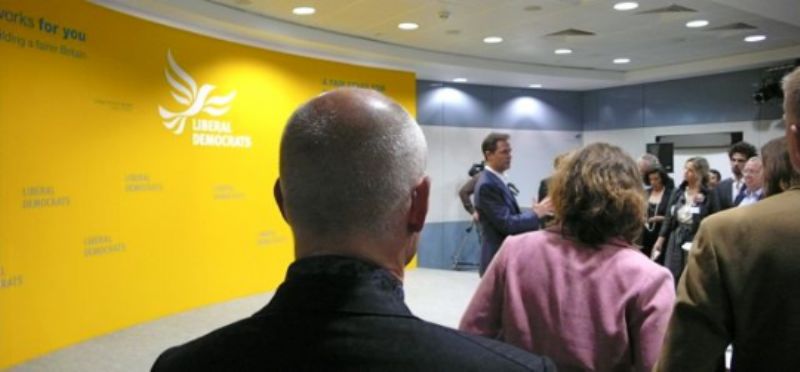 Battle bus
Battle bus  Clegg at work
Clegg at work  Symbolic of British public finances 2011?
Symbolic of British public finances 2011?
Across to the Work Foundation this (Sunday) afternoon for a Lib-Dem ‘green growth rally’, led by Nick Clegg. Outside, the London Marathon, with scenes which made me think of the not-much-discussed-by-politicians looming crisis in public spending. Met a number of the usual suspects, including Tom Burke, James Cameron (the Climate Change Capital variety), DK Matai, Rosie Boycott and Paul Ekins, and found Clegg’s comments encouraging – but not exciting. Later, I did a note that was published by DK’s ATCA, in response to a posting by Clegg. Will copy it below, though the London 2012 idea didn’t make the final ATCA cut, perhaps because I sent it through later.
The ATCA posting:
I am reminded that when we founded SustainAbility way back in 1987, our tagline for many years was ‘The Green Growth Company’ — inspired by the notion that the environmental and wider sustainability agendas will create some of the defining market opportunities of the twenty-first century. The latest report from the World Business Council for Sustainable Development, ‘Vision 2050’, talks about markets worth USD 3-10 trillion by 2050.
But, while I am impressed at the early momentum established by Nick Clegg and his team, welcome his pledge of GBP 3.1 bn and will once again vote Lib Dem next month, I feel very strongly that Britain has a fundamental problem when it comes to sustainability-related enterprise. And it is a problem brought home to me once again when I co-led a study mission of 19 founders and CEOs of UK cleantech companies to California, particularly Silicon Valley, earlier in the year.
Stripped to its essentials, our basic, recurrent problem is that we are not good at bringing new solutions — cleantech or otherwise — to scale. We invent things like railways, exporting them to countries like Switzerland and Argentina (or at least did so when the world was our market oyster), but end up with the Germans increasingly running ours! That’s the new Europe – and I welcome many aspects of it, as I do the fact that Nick Clegg is able to speak a number of languages. But how do we as a nation learn to speak the language of scale? How do we recover our ambition to drive new industrial revolutions?
I was meant to be in Korea last week, speaking at the Business for Environment (B4E) summit, but Vulcan willed otherwise. I was disappointed on various fronts, but particularly because I wanted to talk to some of those behind the country’s Green Economy strategy — which operates against a time horizon out to 2070. Korea sees itself as a future hub of the global Green Economy.
Money isn’t the main problem here, welcome though that GPB 3.1bn would be. Instead, as has often been argued, we need a more entrepreneurial, globally-oriented culture — so, in my dreams, I imagine the Eden Project’s Tim Smit as the UK’s Minister for Green Enterprise — within an evolving economic paradigm forcefully shaped by one of the greatest living Britons, James Lovelock.
And this was my addendum:
My question to Nick Clegg and his colleagues is this: How can we ensure that we develop and sustain a vibrant, internationally significant Green Economy that doesn’t simply gift-wrap our inventions and innovations and hand them over to others (as happened recently with the sale of Cadbury to Kraft) who DO know how to scale?
Much of this comes down to global branding and sustaining national momentum over time. So here’s an idea that I think the next Government should take on. 2010 marks both the London Olympics and the 25th anniversary of the formal introduction of the linked concepts of sustainability and sustainable development by the Brundtland Commission. Under our noses, London has emerged as what I like to call the ‘World Capital of Sustainability’. This isn’t fanciful, it’s reality.
So the question here is how we can both celebrate this fact and build on it, positioning London and the wider UK as a sustainability hub for the world.
I think we should, I think we can, and I think it would be fun to do.
It would also signal the new Government’s serious intent in relation to the great social, environmental and governance challenges of our time, while discreetly noting that we are committed to being the go-to people. And that’s where policies, not just money come in. If we fail to put in place the policy architecture that sustains this, we risk having the whole think implode, like Tony Blair’s ‘Cool Britannia’.
To conclude: There’s a huge market–indeed civilizational–opportunity here to position London and the UK for the new century’s great challenges and opportunities. We should grab it with both hands. But we should do it with others, from the EU to Korea, and we should do it so well that others do our marketing for us.

Leave a Reply